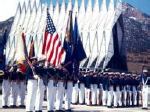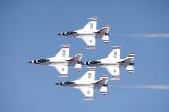





 This
past May four Upper St. Clair families were at the United States
Air Force Academy in Colorado Springs, Colorado, as Amber McKnight,
David Och, Christopher Todaro, and Scott Foreman-members of the 1996
Upper St. Clair High School class-and members of the Academy class of
2000, graduated and became Lieutenants in the United States Air
Force.
This
past May four Upper St. Clair families were at the United States
Air Force Academy in Colorado Springs, Colorado, as Amber McKnight,
David Och, Christopher Todaro, and Scott Foreman-members of the 1996
Upper St. Clair High School class-and members of the Academy class of
2000, graduated and became Lieutenants in the United States Air
Force.
While our Township has many successful college graduates, this event was notable since it is extremely unusual for four seniors from the same high school class to be selected to one Service Academy, be it Annapolis, West Point or Air Force. By law, cadets must be selected from all over the US-every congressional district is represented. So, such a concentration is a tribute to the education received at Upper St. Clair High School, and how it prepared them for the academic rigors of the Academy
Yet, academics is only a part of a service academy. About 1,250 new cadets enter the Air Force Academy in late June each year. They go from a relaxed home and high school environment to a highly structured military atmosphere. Typically, 25-30 percent will not graduate. The academic, military, and athletic programs provide significant challenges requiring total dedication and result in an Air Force officer committed to duty, honor, and service to the nation.
As freshmen (or "doolies") their first summer, they were challenged by the mental and physical demands of Basic Training. They had room inspection, ate meals sitting at attention, studied military history, and learned to march, handle firearms, and work together as a unit. Along with 18 to 22 academic hours each semester, all four Upper St. Clair graduates also had military training and intramural sports to complete.
Life at the Academy, especially the first year, is very structured. As freshmen, they didn't study in shorts and t-shirts, as other college students do-they were required to stay in uniform, even in their dorm rooms. They had infrequent use of the phone and had to earn weekend off-campus privileges. Things ease up after the first year. It's hard for a reason-these cadets will be officers in the Air Force, potentially going into combat. They must develop discipline, structure, mental and physical toughness, and attention to detail-attributes that may save their lives or the lives of others for whom they will eventually be responsible.
Each summer there are required summer programs, in addition to several weeks of vacation. During sophomore summer, all cadets complete Combat Survival Training (CST); where they learn about their own stamina and determination, edible insects and plants, and various escape and evasion techniques. While this may sound a bit like a Boy Scout summer, it's not; training like this has kept many military men and women alive.
Along with CST, cadets also learn to parachute (free fall!) or to solo in a glider. The summer of their junior year cadets are sent to Air Force bases around the world, where they work with other young officers, and see military life and work, up close and personal. In addition, the junior cadets help train the new doolies-where they themselves were only two years earlier!
The Air Force Academy offers 30 academic majors and several minors, including a wide range of sciences, engineering, and humanities, and is rated among the top five undergraduate engineering programs in the country. Amber majored in chemistry, Dave and Chris in management, and Scott in mechanical engineering, while also completing a minor in math.
At the half way point of their senior year, Amber, Dave, Chris, and Scott began preparing for the future by selecting their AFSCs (Air Force Specialty Codes) and choosing bases for their first assignment. Cadets who are physically qualified to be pilots first go to general pilot training and then specialize in fighter jets, bombers, transports, or even helicopters. Pilots will serve in the Air Force for at least ten years, more if they choose. Cadets who will not be pilots (non-rated) also attend specialty schools, in order to learn their future jobs better. They are then assigned to a base to begin their careers. Non-rated officers serve five years, more if they choose.
Amber McKnight chose the electronic communications career field with initial assignment at Laughlin AFB, Texas. Dave Och was selected by the Air Force for a graduate school scholarship to the Katz Graduate School of Business at Pitt. He will follow that with pilot training in 2001. Scott Foreman chose the aircraft maintenance career field; with initial assignment at Shaw AFB, SC. Chris Todaro, after temporary duty at Nellis AFB, Nevada, will attend pilot training at Columbus AFB, MS.
Chris, Scott, Amber, and Dave each did well during these challenging four years; achieving recognition for academic, military, and athletic excellence. Amber and Dave finished in the top ten percent of the 945 graduates (773 men and 172 women), and were named Distinguished Graduates.